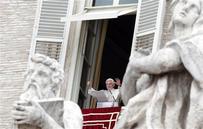Vatican "Regrets" Letter on Bank Chief's Health
By Nicole Winfield
The letter was published in an Italian newspaper Saturday and appeared aimed at further discrediting and humiliating the Vatican bank's ex-president, Ettore Gotti Tedeschi, once a top papal adviser. The bank's board ousted Gotti Tedeschi on May 24, accusing him of failing to do his job, leaking documents and impeding the Vatican's efforts to be more financially transparent. The ouster was a stunning show of Holy See power struggles playing out in real time and came amid one of the greatest scandals facing Pope Benedict XVI's seven-year papacy: the continuous leaks of confidential documents that have laid bare allegations of church corruption, intrigue and even homosexual relationships under Benedict's watch. The pope's personal butler has been arrested in the case, accused of aggravated theft after reams of papal documents were found in his Vatican City apartment. All told, the content of the leaked documents hasn't posed a threat to Benedict's papacy or revealed any great scandal, and on Monday Benedict once again urged his collaborators to remain faithful to him. But the continuous hemorrhaging of confidential memos has painted a picture of a church hierarchy that is little more than a petty, provincial Italian bureaucracy engaged in occasional Machiavellian power plays. It is unclear who leaked the latest letter about Gotti Tedeschi. It was published Saturday in the daily Il Fatto Quotidiano alongside letters from two bank board members to the Vatican secretary of state outlining what they considered Gotti Tedeschi's professional failings. In the most damning letter, a specialist in the psychology of workplace stress, Dr. Pietro Lasalvia, wrote to the Vatican bank's director general, Paolo Cipriani, in March with his concerns about Gotti Tedeschi's personal behavior, which he said he had observed at the bank's Christmas party three months earlier. Lasalvia, who had been brought into the bank a year ago by Cipriani to help the institution cope with workplace stress, said Gotti Tedeschi demonstrated certain behaviors seen in a pathological disorder. In a statement issued after the letter's publication, Lasalvia stressed that his was not a diagnosis but merely observations based on an informal chat with Gotti Tedeschi. He nevertheless used clinical terms to describe what he observed and wrote them on official letterhead. In a statement Monday to The Associated Press, Vatican spokesman the Rev. Federico Lombardi said the letter was wrongly released and published, and that its publication was "completely unacceptable and cause for true regret, in particular from the point of view of the respect that should be owed to the interested people." He declined to respond to questions about the appropriateness of Lasalvia's correspondence to Cipriani in the first place, given the privacy concerns involved, and whether Lasalvia would continue working with the bank, known as the Institute for Religious Works, or IOR. In an email to the AP late Monday, Lasalvia said he joined Lombard's sense of "regret and I add my disconcertment" over what had happened. In a statement, his lawyer Paolo Gallinelli stressed that Lasalvia's letter was by no means a "plot" intended to harm Gotti Tedeschi, but was merely information he had wanted to "crystalize" to help Cipriani evaluate the IOR's stress levels. Gotti Tedeschi hasn't commented in any detailed manner on his departure from the bank or on the letter's release. His ouster was followed by another stunning development — a police raid on his Piacenza home last week as part of an unrelated corruption probe in which he is not under investigation. While prosecutors insisted at the time that his role as the IOR's ex-president had nothing to do with the raid, police did seize a memorandum he had prepared for the pope defending himself against the allegations made by the bank's board. Gotti Tedeschi's ouster, and the ongoing leaks scandal, have come at a terribly delicate time for the Holy See, which will learn in the first week of July if its efforts to shed its decades-old reputation as a scandal-clad offshore tax haven have borne fruit. The Council of Europe's Moneyval committee will rate the Holy See's compliance with a host of recommendations aimed at fighting money laundering and terror financing — a key step in the Vatican's bid to get on the so-called "white list" of countries that share financial information to crack down on tax evasion. On Monday, Lombardi appeared to downplay expectations of the Moneyval meeting, noting that the Holy See is a unique entity compared to the countries that go through the Moneyval process. He said it's only "normal and natural" that it takes time to integrate the Vatican's finances into the world financial order — a complex process that he termed an "epochal" shift for the Holy See to submit its finances to outside, lay evaluators. "This isn't easy, or immediately smooth," he said. "We had the courage and will to take this step, and for me that's a big deal. How much time, how we proceed along this path, how long it takes and the quality it takes — it's a new world. It's not something that's foreseeable or calculable."
|
.
Any original material on these pages is copyright © BishopAccountability.org 2004. Reproduce freely with attribution.
